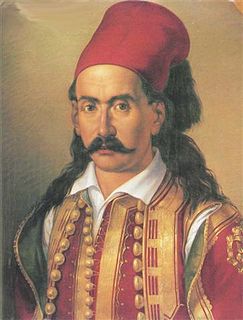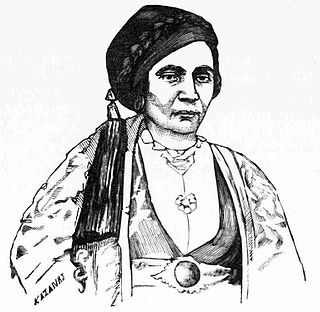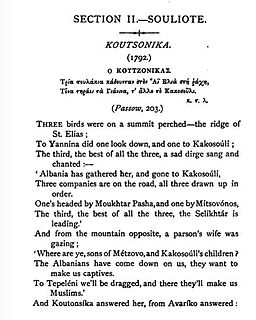 W
WKaterina "Rosa" Botsari was a Greek courtier. She was member of the Souliot Botsaris family. The daughter of Markos Botsaris, she was in the service of Queen Amalia of Greece as well as an admired young woman throughout the European courts - she was immortalised for the 'Gallery of Beauties' of Ludwig I of Bavaria in an 1841 painting by Joseph Stieler. A Damask rose species bred in 1856 was named Rosa Botsaris after her. In 1845 she married prince and general George Caradja.
 W
WDimitrios Botsaris was a Greek Army officer and Minister for Military Affairs.
 W
WKostas (Kitsos) Botsaris, also known as Constantine Botzaris, was a Greek general and senator. He was also a captain and a hero of the War of Greek Independence. He fought at the Battle of Karpenisi and completed the victory of his brother, the renowned Markos Botsaris.
 W
WMarkos Botsaris was a Greek hero of the Greek War of Independence and chieftain of the Souliotes. Botsaris is among the most revered national heroes in Greece. He was posthumously awarded the title of general.
 W
WCaptain George Costentenus or "The Greek Albanian," was a circus performer in the late 1800s. A man who was tattooed over his entire body, he was a famous traveling attraction who claimed to have been kidnapped by Chinese Tartars and tattooed against his will. His surname was sometimes spelled as Constantenus and Constantinius. He was also known as Djordgi Konstantinus and Georgius Constantine.
 W
WThe Dance of Zalongo refers to the mass suicide of women from Souli and their children that occurred in the aftermath of the invasion of Ottoman troops on December 16, 1803. The event is commemorated in Greece in the context of the Greek War of Independence. A number of 60 women were trapped near the village of Zalongo in Epirus, modern Greece, then Ottoman Empire and decided to turn towards the cliff's edge and die with their infants and children rather to submit to the Ottoman troops chasing them. According to tradition they did this one after the other while dancing and singing. The name also refers a number of Greek theatrical dramas and a song in folk style, commemorating the event, named "Dance of Zalongo".
 W
WPanagiotis Danglis was a Greek chieftain during the Greek Revolution of 1821. He was born in Souli and was the son of Gogas Danglis. During the period of the Revolution, he was chieftain of Souli (1820–1822). He died in 1829 in Nafpaktos.
 W
WThe Greek Legion, officially the Light Jäger Foot Legion, was a Jäger infantry unit in the service of the Russian-controlled Septinsular Republic. It consisted of soldiers of Greek and Albanian origin and was led by Major-General Emmanouil Papadopoulos. It was active between 1805 and 1807, taking part in the War of the Third Coalition and the Russo-Turkish War (1806–1812).
 W
WLambros Koutsonikas was a Souliote fighter of the Greek Revolution of 1821, army officer and amateur historian of the Revolution.
 W
WPhotini Kolokotroni–Tzavela served as Lady-in-Waiting at the royal court of King Otto. She was the daughter of the chieftain Photos Tzavelas, sister of Kitsos Tzavelas, prime minister of Greece, wife of Ioannis (Gennaios) Kolokotronis, also prime minister and mother of the journalist Theodoros Kolokotronis.
 W
WThe Souliote War was an armed conflict between Ali Pasha of Ioannina and a coalition of Souliotes and their Muslim allies. The war lasted between February 1789 and April 1793 and was fought in the context of the Russo-Turkish War (1787–1792) and local power struggles. The Souliotes achieved a defensive victory but failed to foment a big Christian insurrection as originally planned.
 W
WThe war between the warlike communities of Souliotes in Epirus and the local Ottoman ruler, Ali Pasha, in 1803, was the last of a series of conflicts, known as the Souliote Wars, that led, finally, to the capitulation and expulsion of the Souliotes.
 W
WA cycle of folk songs pertaining to the Souliotes and mainly to their wars against the Turks and the Albanians of Ali Pasha in 18th and early 19th century.
 W
WKyriakos “Kitsos” Tzavelas was a Greek fighter in the Greek War of Independence and later Hellenic Army General and Prime Minister of Greece.
 W
WGeneral Napoleon Zervas was a Greek general and resistance leader during World War II. He organized and led the National Republican Greek League (EDES), the second most significant, in terms of size and activity, resistance organization against the Axis Occupation of Greece.
 W
WNikolaos Zervas was a Greek revolutionary and Army general.